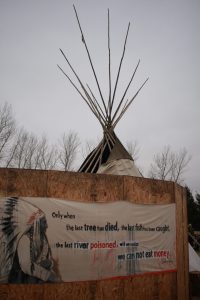This November, I took an opportunity to stand with Standing Rock, joining the CascadiaNow! and Backbone Campaign to deliver stoves and assist in the winterization process for the water protector camps (in North Dakota).
Most of the stories to come out of the effort to stop the Dakota Access Pipeline have been conflict based; men and women, young and old in the path of riot police and private security using rubber bullets, pepper spray, concussion grenades, sound cannons, water cannons, and attack dogs.
It’s good that these conversations are taking place. Militarized police terrorizing indigenous people on their legal territory should be discussed into the highest courts of the land.
I never saw the violent tactics used by police, as I stayed off the front lines. I preferred to be without arrest, and the experience I had was one without conflict, rather one of peace and welcome alongside the thousands of people gathered. As the Lakota say, Mni Wiconi, water is life. Everyone assembled was there to protect that life, and it showed in every interaction I had.
I consider myself lucky for the community I was raised in. I feel we work to connect to the land, each other, and our traditions in a good way. I’ve seen deep and loving cultures manifested in neighborhoods, religious groups, festivals, and workplaces. Despite all this, I have never seen a more unified way where work, food, care, and prayer were shared than in the camps hosted by the Lakota Souix.
First and foremost, a gathering of this scale is unprecedented. This gathering is the first time the seven council fires of the Souix were joined since Greasy Grass, or Little Bighorn, in 1876. While I was there, more than 300 indigenous nations were represented, from Alaska to Baja, Florida to the Hudson Bay. Never before have so many indigenous American groups met in one place. Historical enemies were side-by-side, cutting wood and making food with each other. Songs were sung from morning till night, and prayer filled the air. We were all welcomed as relatives.
The code of conduct was simple; to be of use while building a new legacy centered on indigenous leadership. Indigenous folks tend to listen well, and speak with care, it took considerate effort to adjust to that pace. The new legacy was being built all around me. Generations of trauma were being worked through, and healed. Stories were shared and people stepped up to take care of what was needed, whatever relative it was in need. The work felt good and useful and well-received.
If treaty rights were treated as law, which was guaranteed by the U.S. government, the current path of this pipeline would not be considered. Energy Transfer Partners would have no legal right to pass through sovereign Souix territories and under the Missouri River. The pipeline directly endangers the water source of more than 17 million people downstream from the Missouri crossing. If oil leaked underground into the Oglala aquifer, North America’s largest freshwater source would be polluted.
Mni Wiconi, water is life. We all need water to live. Pipelines break at some point, a question of when rather than if. The crude oil to be carried in the pipeline comes from fracking, another ecological mess. Fracking as an extraction method pollutes groundwater, causing birth defects in humans and untold plant and animal life.
If we want to give our grandchildren and ourselves a place to live healthfully, we need to work towards more environmentally responsible fuel, food, industry, and living. We need to move forward together in thoughtful and considerate ways, while in conversation with the cultures that have been stewards of this land for 10,000 years.
And we need to pray, a lot. Good intention, resolute spirits, and compassion will be our saving graces, should we choose to follow them. To start healing the wound colonization still deepens, we need to recognize the simple truths that tie us to our natural world.
Clean water, soil fertility, biological diversity, and cultural integrity are not easily restored once lost. Humans have always needed these things to survive, and always will. I think our work now is to value these well springs of life so that we may maintain them for the seven generations to come. If we protect the sources of life, they will fill our generations with abundance. If we disregard them, they cannot provide for us. Mni Wiconi, water is life.
Benjamin Cedartree is a resident of Silverton,
